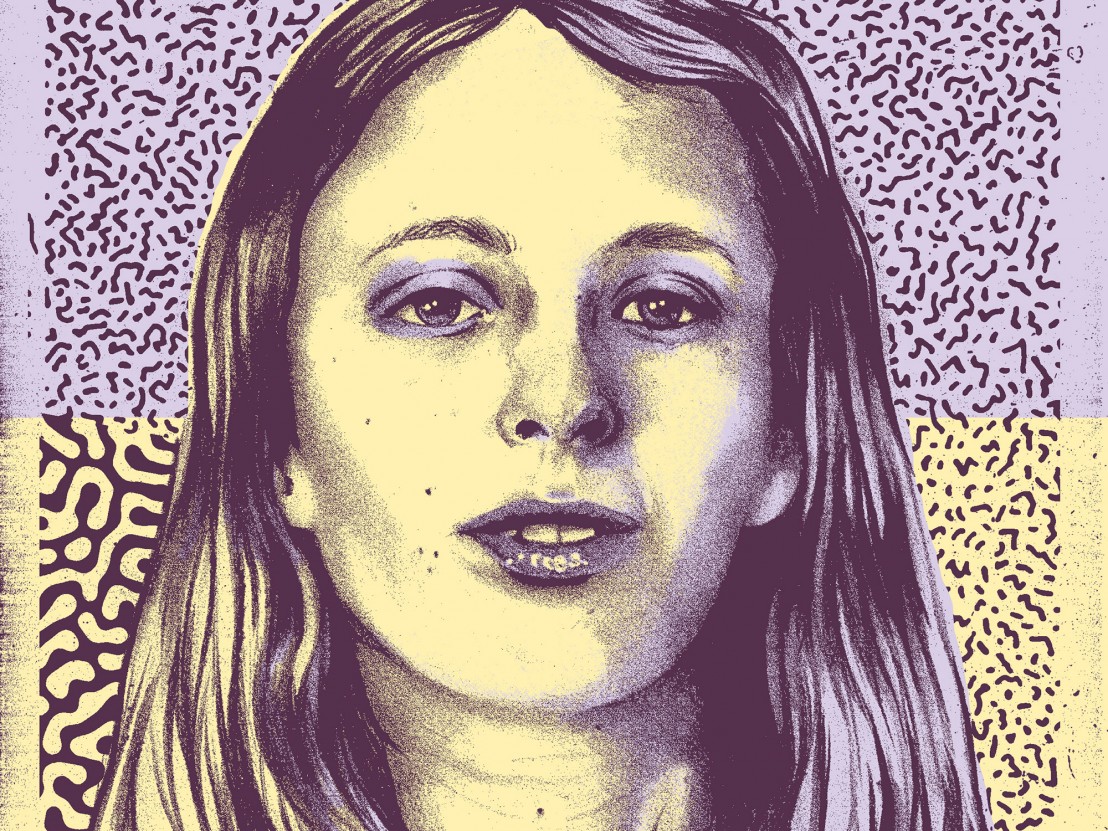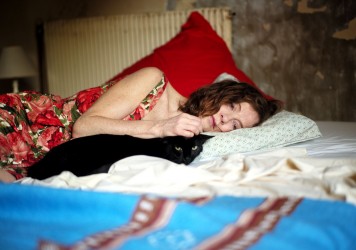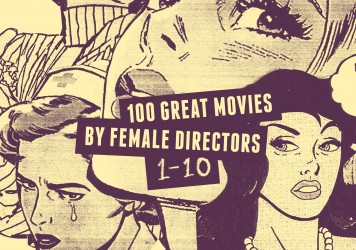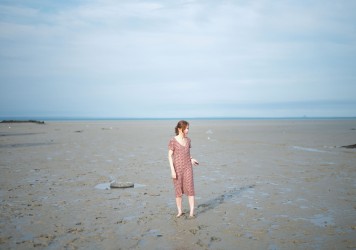
The French writer/director discusses how moviemaking can be an act of pure personal expression.
In architectural terms, Mia Hansen-Løve builds movies on lop-sided ground and the structures she produces are never perfect geometric shapes which slot comfortably into the skyline. As a student she studied German and specialised in philosophy, though the world caught its first glimpse of her at age 17 through a small role in Olivier Assayas’ 1998 film, Late August, Early September. Less than 10 years later she had arrived with her directorial debut, the raw family saga All is Forgiven which introduced a yen for depicting life’s random realities over compartmentalising drama in order to fit neatly onto the screen.
Two years later she set Cannes aflame with her devastating The Father of My Children, a story which was inspired by the real life film producer Humbert Balsan who, in 2005, took his own life. It’s a special film as its “climax” sits at the dead centre of the runtime, allowing Hansen-Løve to examine the fallout in as much detail as she does the setup. Hansen-Løve’s 2011 film Goodbye, First Love cemented her status as a master of intuitive and unsentimental filmmaking, presenting a girl coming to terms that a whirlwind formative romance is over. Her latest, Eden, borrows the life of her brother, a house DJ in France who spun his way into penury due to his rabid commitment to his art. Félix de Givry plays Sven’s disheveled onscreen avatar, Paul.
LWLies: How close are the events in Eden to the reality of your brother’s life?
Hansen-Løve: Very close. My brother has said 100 per cent. It’s probably not the case for me, as when you write a film it instantly becomes fiction. There is a selection process. There are things you say, things you don’t. It’s a perception of events. It’s about reconstruction. So it’s extremely close to my perception of what my brother’s life is about, what it is, how it feels. It was exciting to write. But it was also funny discovering that Sven had forgotten so much. Maybe because of the drugs. There was some memories that I was recalling better from his own life. Girlfriends he’d completely forgotten about.
When the events of the film were happening, did you feel there was something cinematic about them? Or was it only with hindsight you saw it?
No, I never had any idea. I was too young. When I started to go to my brother’s parties I was 13. He was working as a DJ in a bar in Bastille and people were just pushing the tables to the side to dance. It wasn’t meant to be a club. At the same time there were great house clubs popping up, like The Queen, where we used to go. I didn’t know I wanted to be a filmmaker at that point. I never felt I was observing things. First, I started writing alone, but then I realised I needed Sven as I just had tons of questions I had to ask him about his memories. It was quite an effort to get him to remember events, but he did recall the feelings and the emotions. People and places were all very foggy. I too have a very bad memory, and I sometimes think that’s why I make films. As a way to reconstruct the ruins of the past.
And Sven’s memories, too?
I wrote the structure to the film on my own, and the more it went on, the more I felt how stimulating and interesting it would be for me to include scenes that he would write. He spent so much time in clubs with this same group of friends. No one could capture these scenes as well as he could. I was always with this group, but I was a much more solitary person. It’s a way of living where you’re never alone.
Was Sven okay with you wanting to make a movie about his life?
Yeah, it was very simple. We’ve always been very close. He knows that I make films inspired by the people I know. So it wasn’t a big surprise. When I started to tell him about it, I wasn’t even sure I was going to do it. Early on, it all seemed too difficult. And it was. To finance, it was a nightmare. I wasn’t so sure… I felt there was something great to do that was historic, about our generation. I had the feeling that I could make a film about our generation that was totally relevant if we focused on this story. Especially because it wasn’t a success story. It made me feel the film could be more universal. I realised no-one has done a movie about house music in France. No one is taking it seriously. No one is filming in nightclubs in a realistic way. Filmmakers all have their club scene, but nobody makes a whole film in one. At that point he was broke and depressed and he was trying to start a new life writing short stories. And he actually got published. It was tough. He was rejecting his own story as a DJ. He saw it as a way to have a new perspective on his story and find a new energy and desire that he had lost.
Did you speak to any other characters involved in the story?
A lot of the boys are still Sven’s friends. They were involved in the project. Especially the one played by Vincent Macaigne who has long hair who plays a hypochondriac. The real guy is one of my brother’s best friends. He’s a radio presenter, and it’s weird because he interviewed us about the film. My films navigate from fiction to reality, and I feel that in my life. My films are influenced by reality, but my life is influenced by my films. Sometimes I have the feeling I make films in order to create some kind of confusion in my life between fiction and reality. I need this confusion. It helps me feel accomplished. It’s crucial for me. I have the feeling with this film that I went so far in creating this confusion that I still feel like I’m living in this world. All the things that I’ve taken from my life and my brother’s life to build Eden, now it’s given back to me in real life. I feel like I am stuck in film just as Paul feels like he’s stuck in house music.
There’s a sequence where Paul describes the music he loves as a mixture of euphoria and melancholy, which seems to also speak about your style of cinema.
I think I became aware of this juxtaposition in the process of making this film. When I started writing, thinking about it, the melancholy came first. It all started from the situation of my brother, which was really bad. But still, when I started working on the first draft and constructing the story, it was about a successful person. It’s not that it was all about happiness and joy. But I wasn’t thinking about the melancholy as something I wanted to show. It was just there, as it’s there in pretty much everything I do. Later, especially after I or Sven wrote it, the scene in the radio station where they talk about the music and Paul says about the MK song that he loves it because it a mixture of euphoria and melancholy. I only then realised I was talking about my own style. It’s interesting because it made me understand the connection between my films and the music. You might think that there’s not much of a connection between the films I’ve seen before and garage music – they’re two different worlds. And ultimately I think that one of the reasons I connected with this music is not only personal history and the fact my brother was involved in it, which of course is crucial, but it’s also the fact that you have this mixture. And that’s the one think I connect with. You find it in the music of Daft Punk.
Is this a pessimistic movie?
No. I think it’s melancholic, but pessimistic? I don’t know. With this character, I don’t see him as bad or good. But he had to do this long detour to find himself. It’s because he’s been through that and touched the bottom of it and experienced that world as intensively as he has that ultimately he will be able to write a book about himself. I don’t see it as a downer. It’s time lost maybe? But Proust’s ‘A la Recherche du Temps Perdu’ makes for a great book, so… Losing time is precious. I see a lot of poetry in it. When I say poetry, I don’t mean writing. I mean life. There is nothing more beautiful than this loss. I care for that. I notice that for some people, probably people of our parents’ generation, for them all of this is very vain as they don’t see how deep or how strong the relationship with the music is. It’s nothing. It’s the void. Because he has no children and no girlfriend and ends up broke and alone, I’ve noticed that from a friend of mine who is slightly older, he says it’s all in vain. But you could say he’s fragile, he doesn’t know what he wants, he’s not a hero in the more classical meaning of heroes. Still, for me, he had to live like that. And I don’t see why his life would be any less interesting or essential than any other life. It will give him the keys to literature.
Could he have the same experience with literature?
I don’t think so. Maybe he will make mistakes and get lost again, but he will produce something. Something that stays. The thing about the music is that in the end, he has nothing to show for it.
As someone who writes and directs, when do you know there’s something you can make a film about?
I think it has to do with the certitude or the conviction that there is a film to be made. It’s a matter of relationships – the relationship that I have with the characters. More precisely, the emotion I have when I think of the presence of these characters. I don’t have to know these characters, but I have to be connected to them. Actually, the character could be a woman, a man, a child, an old lady. It’s the character that makes me excited about making movies. And I haven’t really talked about this, but I really think there’s something erotic involved in that process. Or sensual. It’s not just theoretical. It’s instinctive. I have to have an attraction to a presence.
When you have thought of these characters, do you write down descriptions or is that something you keep in your head?
I never do that. My greatest fear is that a producer asks me to write a treatment. It’s never happened so far. I do have the feeling that I control what the character is like. I’m not a writer to the point where I could write novels instead of films. I know the musicality of these people, and it would be tough for me to rationalise them.
When you talk about these characters to the actors you’ve hired, how much detail do you go into?
I’m not so specific. I’ve never really worked with actors who think you should know the entire history of a character before you play them, and I don’t really like that. The truth of the character would come entirely from what happens in front of the camera – how they talk, how they move, how they develop a rhythm. Something that’s hard to define. I’m a director who requires a lot of takes. I’ve never really had to help build the psychology of a character, but I do help to develop it. I’m about to shoot a film with Isabelle Huppert this summer and she understands perfectly what the character is about. I don’t have to explain anything to her. You know when you buy a play and there are pages that explain how you should dramatise it, well we don’t need that. Also, it’s true that for me, half of what the character is about comes from the actor.
How do you describe your style?
I don’t think I could, especially speaking in English. It’s crucial for me, but typically my style is not obvious. I mean, the way I make movies, I generally don’t want the style to be identifiable. I like it to be transparent, but I know that it can’t be because transparency in film doesn’t exist. I never want people watching my films to think, ‘Oh, this is a great shot.’ I never felt like I have anything to prove to the audience. I place all the importance to the things in the frame, not the frame itself. I want to be invisible. Basically, I’m open to a lot of different things. I’m not the kind of director who would make a film using six shots or with a handheld camera. I like the idea that my style is homogenous. It’s not something that’s easy to define.
What do you think of your early films?
I don’t watch them again, but I sometimes see the beginning and the end when I’m attending screenings. It’s very hard for me to have a critical eye on them, not because I think everything I do is great, but because they’re so important to me. They’re part of me. Not liking them would be not liking myself. And that would be insane. I don’t even think of them as films. They’re like my hand. Of course I think that there are shots that I would have done differently, and it’s good for a filmmaker to constantly want to evolve and change things. The reason I make films is that it’s a way for me to harvest my own memories. With all my films, with all their weakness, they are true testimonies of who I was and what my concerns were.
Published 23 Jul 2015

Director Mia Hansen-Løve delivers something wonderful and somewhat unexpected – a film about cats.

Read part one of our countdown celebrating the greatest female artists in the film industry.

The screen icon discusses her craft plus her upcoming roles in Mia Hansen-Løve’s Things to Come and Michael Haneke’s Happy End.